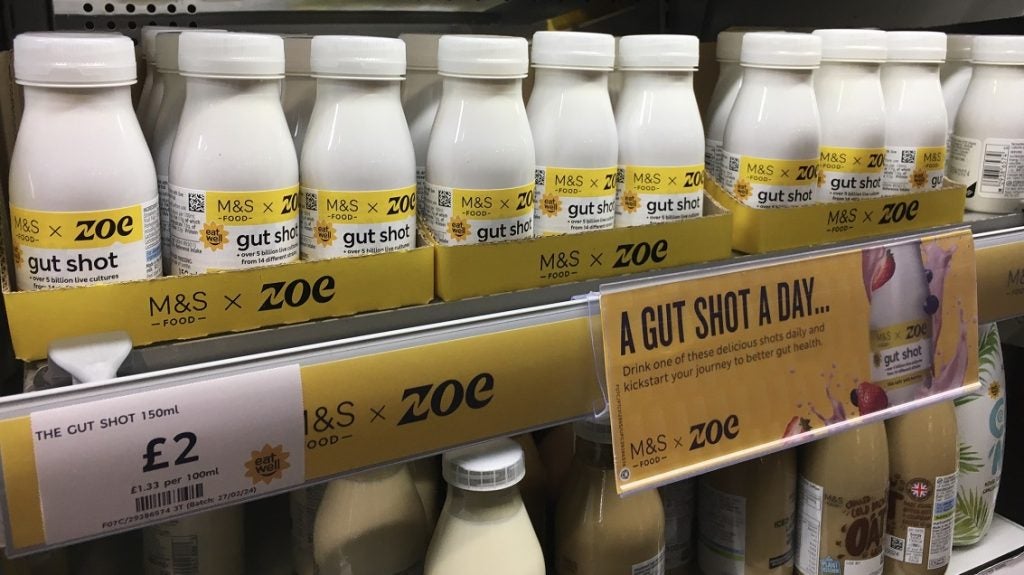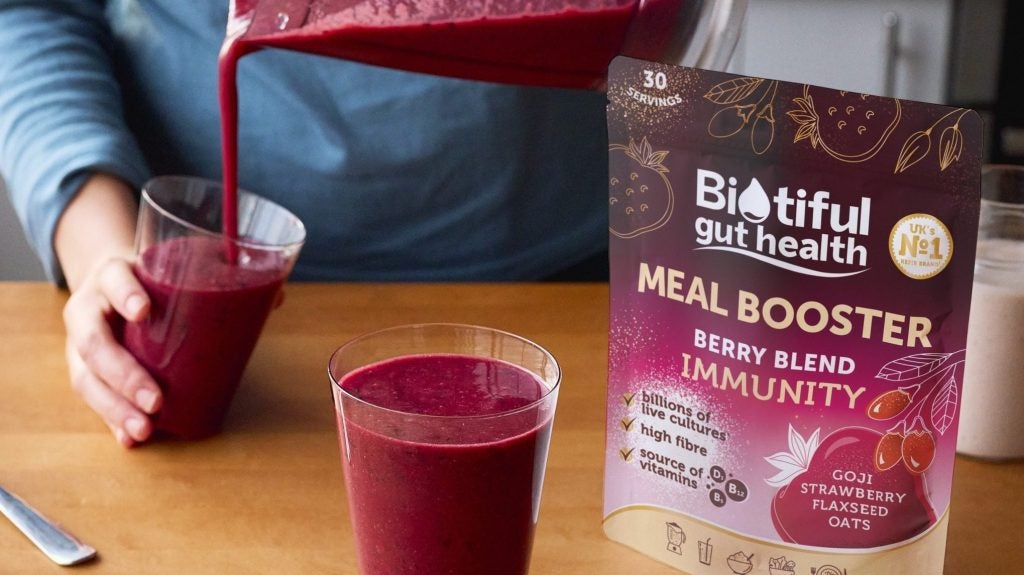
Is there a place for dairy in the “macro-trend” playing out in gut health?
Biotiful Gut Health, the manufacturer of fermented, probiotic kefir drinks and live culture yogurts, argues there is.

Discover B2B Marketing That Performs
Combine business intelligence and editorial excellence to reach engaged professionals across 36 leading media platforms.
“There’s a lot of talk around gut health, within dairy specifically, being a big area of growth over the next year or two,” Vince Lawson, the chief marketing officer at Biotiful Gut Health, says with regard to what he suggests is a “macro-trend”.
“Categories like dairy, which has a 90% penetration rate, are ripe for evolution or revolution. Whilst working with the retailers to help educate consumers, it’s actually a relatively easy transition to step into gut health within dairy, versus completely changing their consumption habits.”
However, the company has just expanded beyond the chilled aisle into ambient meals with Meal Boosters, suggesting consumer interest is more widespread and not unique to dairy.
That’s the opinion, too, of some food industry watchers. Siobhan Gehin, a senior partner at global consultancy Roland Berger, says the growth in ambient gut-health products is “probably going to be stronger” than in dairy.

US Tariffs are shifting - will you react or anticipate?
Don’t let policy changes catch you off guard. Stay proactive with real-time data and expert analysis.
By GlobalDataGut-friendly dairy is nothing new, from Danone’s fortified Actimel cultured yogurt drinks to the Japanese-origin Yakult brand of fermented, probiotic milk beverages. More recently, UK retailer Marks and Spencer has launched high-fibre Zoe gut shots, packing five billion live cultures.

There is increasing scientific research into – and growing awareness – of the microbiome, an area still little understood by the average consumer.
Microbiomes in the gut can be altered through our diets, which is where gut-health products come to the fore to create a healthier microbiome. Research suggests the healthy types can aid a plethora of conditions – from depression to bowel disorders such as IBS, and even Alzheimer’s and Parkinson’s.
From a broad perspective, Gehin suggests interest in gut-health products is more than just a “fad”, reaching beyond dairy.
“The gut microbiome, which was not really considered that much of a thing ten years ago, is now a massive and groundbreaking area of scientific research,” she says.
“Covid then coming on top of it means that people are more concerned about their health. However, there’s definitely a school of thought that says you don’t really need to take probiotics if you eat enough of the right kind of fibre but, of course, there’s a market for probiotics.”
However, while she argues more educational awareness is needed to promote gut health, when it comes to existing dairy products, Gehin adds that “people are looking for something that taps into the zeitgeist a little bit more specifically”.
It’s a view shared by Stephanie Lind, the founder and chief strategy officer of Chicago-based Elohi Strategic Advisors.
The big challenge a dairy company is going to have is connecting dairy to health
Stephanie Lind, Elohi Strategic Advisors
“Health and wellness has been a mega-trend for consumers since 2000. What’s interesting to me is I don’t think that there have been major changes.
“People have been talking about probiotics for a while now and prebiotics for five or ten years. It’s not that it’s a new trend, it’s that, as we learn more and the consumer learns more, they think about it differently in their diet.
“I think consumer trends are such that they’re learning more and more that they don’t need probiotics from a dairy-based product. They do look for probiotics and prebiotics in wellness drinks. The big challenge to me that a dairy company is going to have is connecting dairy to health.”
Lind argues in some cases other fermented foods offer the same or superior health benefits to gut-health dairy products. Gehin agrees, suggesting some of the emerging and better-placed products fall into the ambient category, such as supplements, kimchi or powders.
“I think people are looking for messaging that is a bit more specific to all of the research that’s coming out about gut health and the gut microbiome,” Gehin says. “Somehow, I think the traditional products don’t seem to be tapping into that need in quite the same way.”
The rise of colostrum
Lind argues the dairy category “missed their window”, framing her comment around the fact that “in some ways, the fermented foods and plant-based trends took this opportunity away from dairy companies”.
However, Lawson at Biotiful suggests the kefir category, along with protein-based products, are the “only two subcategories within dairy that are in growth at the moment” – double-digits, as he puts it.
“I think there’s a lot of people coming into, let’s call it natural health, with dairy gut health being a big part of that and gut health actually spanning a number of different subcategories,” Lawson says.
“For us as a business, it isn’t just about solving a gut-health issue. Better gut health can really benefit consumers even if you don’t have a gut problem.”
Mayuresh Bedekar, a director of product strategy for bioactive ingredients at Glanbia Nutritionals, says there’s been a rise in interest for dairy ingredients that are supportive of gut health and immunity since the pandemic.
“There has been an advent of dairy ingredients for their role in gut health, which then supports many body functions, most importantly in building immunity,” California-based Bedekar says.
“Dairy ingredients have traditionally been recognised as an excellent source of proteins such as whey proteins, peptides, caseins and minerals such as calcium.”
He does, however, recognise that fermented dairy products such as yogurt with live and active cultures have been “popular among consumers for decades”, but suggests the use of colostrum, or first milk, is becoming increasingly popular for a host of health and wellness applications.
“Dairy-based ingredients like colostrum offer a new opportunity for consumers to incorporate gut-health supplements in their everyday diets, whether added to powdered beverages, smoothies, protein shakes or in a capsule.
“Colostrum has a pleasant, milky taste profile, easy to formulate by finished product manufacturers and hence easy to consume in different formats and across all age groups.”
Bedekar explains that colostrum helps support the intestinal lining and contains prebiotics to “feed beneficial bacteria and support a balanced gut”, adding it is “rich in several bioactives, mainly immunoglobulins”.
Educational element
Beneficial or not, gut-health products, dairy or otherwise, tend to come with a hefty price tag, posing a barrier to take-up and growth. Gehin at Roland Berger suggests consumers may be “willing to pay a premium” but the whole gut-health area is likely to remain “niche”, at least in the short term.
“I think it has longevity but there’s a need for education as well based around the underlying scientific progress. I think it will grow in awareness,” she says.

Based on Biotiful’s own research last year, Lawson says the majority of the UK adults it surveyed were aware of the importance of gut health but did not “necessarily know what to do about it or why it’s important”.
He adds: “I think one of the big barriers to people coming into healthy subcategories, not just within dairy but across the whole spectrum, is the perception that healthy food doesn’t necessarily taste great.
“If brands like Biotiful can continue to deliver on taste, which is the first thing consumers care about, with natural ingredients and natural gut health within the dairy space, I think we will continue to see the growth of brands like Biotiful over those that may have been more established for a longer period of time.”
I don’t know what the American appetite is for some of these products
Mark DiDomenico, Elohi Strategic Advisors
Taste is a key area identified by Lind at Elohi as a potential barrier to entry, especially when it comes to kefir.
“I don’t see Americans sitting down anytime soon to drink a glass of kefir. They’re never going to make kefir taste good if you don’t like tart and tangy things,” she argues.
Lind’s colleague at Elohi, chief insights officer Mark DiDomenico, suggests the take-up of gut-health products has been slow, especially amid consumer reconsiderations during Covid and since the pandemic.
“It’s a slow slog. I don’t know what the American appetite is for some of these products,” DiDomenico says.
“There’s a pushback to functional foods that we’re seeing a little bit of because people are saying: ‘You know what, just give me the fruits and vegetables. I don’t need all these fancy things. I think if I eat right, if I have carrots and broccoli and lean meat, I won’t need any of this stuff.’
“There’s a long ramp for these things because clearly the benefits are there. It’s just there’s a little bit of a pushback going on right now.”





